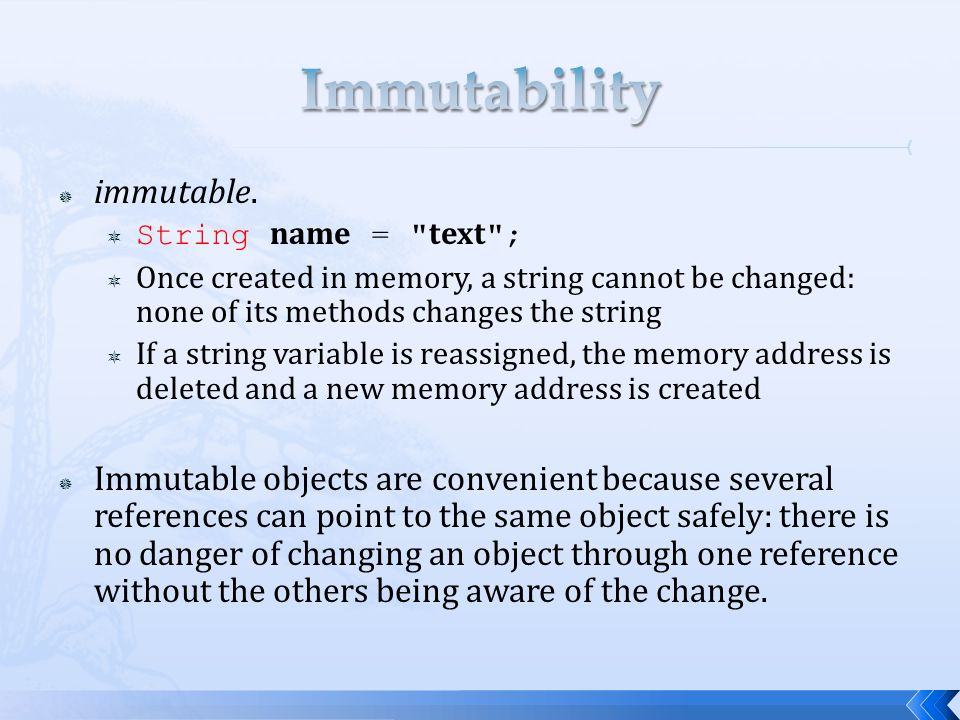Why Are Strings Immutable in Java? Exploring the Design Choices
Why Are Strings Immutable in Java? Exploring the Design Choices
Blog Article
Unalterable Strings: A Trick Component in Ensuring Information Uniformity and Dependability
In the world of information management, the relevance of unalterable strings can not be overemphasized. These imperishable series of characters play a critical duty in maintaining the integrity and accuracy of details within systems. By keeping a state of immutability, information consistency is guaranteed, cultivating a foundation of dependability upon which critical procedures rely. The idea of immutable strings transcends simple formality; it is a cornerstone in the facility web of data governance. As we check out the benefits, application strategies, and useful applications of immutable strings, a more clear photo emerges of their crucial nature in securing the electronic landscape.
The Concept of Unalterable Strings
Immutable strings, a basic idea in shows, describe strings that can not be modified once they are developed. Fundamentally, as soon as a string worth is designated, any procedure that appears to modify the string actually produces a new string. This immutability guarantees data uniformity and dependability in applications, as it avoids unexpected modifications to the original information.
Benefits in Information Consistency

Information uniformity is critical in numerous aspects of software application growth, consisting of database administration, multi-threaded settings, and distributed systems (Why are strings immutable in Java?). Unalterable strings add substantially to accomplishing this uniformity by stopping data corruption as a result of concurrent accessibility. In situations where multiple procedures or strings engage with the exact same data at the same time, immutable strings work as a secure versus race conditions and synchronization concerns
Furthermore, the immutability of strings streamlines debugging and testing procedures. With unalterable strings, designers can rely on that once a string is established, it will certainly continue to be the same, making it easier to trace the source of mistakes and ensuring that examination instances create regular results. This integrity in information handling inevitably brings about more robust and secure applications.

Carrying Out Immutable Strings
Ensuring the immutability of strings calls for a thoughtful strategy to their implementation in software program advancement. Once a string item is developed, one crucial strategy is to develop string classes in a means that avoids alterations. By making strings unalterable, designers can boost data uniformity and integrity in their applications.
To carry out immutable strings successfully, developers should prefer creating new string items instead of modifying existing ones. This method ensures that when a string is appointed a value, it can not be altered. Furthermore, any type of procedure that appears to change the string needs to create a new string with the wanted modifications as opposed to altering the original.
Moreover, making use of unalterable strings can simplify concurrency management in multi-threaded atmospheres. Since immutable strings can not be changed after production, they can be securely shared web link among numerous strings without the threat of information corruption.
Function in Dependability Guarantee
In software growth, the use of unalterable strings plays an important duty in guaranteeing the reliability of data operations. Immutable strings, as soon as created, can not be modified, guaranteeing that the information they represent stays constant throughout the application's implementation. This immutability residential property provides a level of assurance that the data being processed will certainly not be accidentally transformed, causing unforeseen outcomes or errors in the system.
By incorporating immutable strings right into software application design, programmers can enhance the reliability of their applications by minimizing the risks connected with mutable information - Why are strings immutable in Java?. Immutable strings help in preventing information corruption or unintentional modifications, which can be particularly critical when handling delicate info or when data honesty is paramount
Furthermore, the usage of unalterable strings simplifies simultaneous processing, as numerous strings can securely access and share string data without the threat of one string changing the material while another reads it. This facet adds dramatically to the general reliability of the software program system, ensuring regular and predictable habits in information managing procedures.
Applications and System Assimilation
The smooth integration of unalterable strings into numerous applications and systems is critical for guaranteeing durable information consistency and integrity across diverse technological settings - Why are strings immutable in Java?. Immutable browse around this web-site strings play a crucial function in improving the honesty of data exchanges and communications within complex software environments. By integrating immutable strings right into applications, designers can minimize the dangers connected with information tampering, unauthorized adjustments, and unintended changes, thus strengthening the general safety and security stance of the system
In the context of system integration, unalterable strings function as a fundamental element for establishing protected communication channels and promoting smooth information transfers between various parts. Their unalterable nature ensures that information sent between systems remains proven and unchanged, minimizing the possibility of disparities or mistakes that can endanger the honesty of the entire system. Additionally, unalterable strings can boost interoperability between inconsonant systems by providing a standardized format for data depiction, making it possible for extra reliable information processing and exchange procedures across interconnected platforms. By embracing unalterable strings in applications and system assimilation procedures, companies can strengthen their information framework and promote the integrity and consistency of their information assets.
Verdict
In final thought, unalterable strings play a critical duty in preserving information uniformity directory and integrity in different applications and system integrations. By ensuring that strings can not be transformed as soon as produced, the stability of information is preserved, lowering the danger of errors and variances. Carrying out unalterable strings can dramatically enhance the reliability of systems, ultimately resulting in more dependable and exact data handling.

Report this page